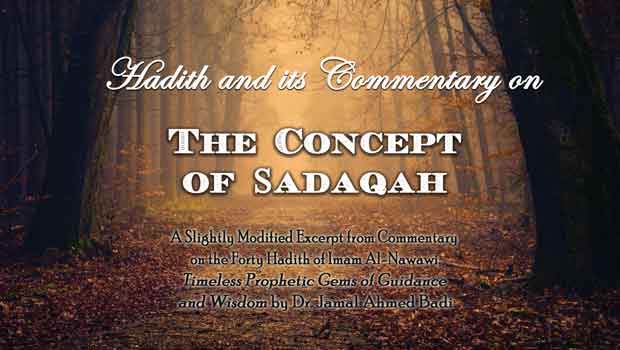An Excerpt from Commentary on the Forty Hadith of Imam Al-Nawawi
Timeless Prophetic Gems of Guidance and Wisdom
–
Abū Dharr reported that some of the Companions of the Messenger of Allah (peace be upon him) said to him:
“O Messenger of Allah, the rich have taken all the rewards. They observe the prayer as we do, and they keep the fasts as we do, and they give sadaqah from their surplus wealth.” Upon this he (pbuh) said: “Has Allah not made for you (a course) by which you can also do sadaqah? Verily, every tasbih is a sadaqah, every takbir is a sadaqah, every tahmid is a sadaqah, every tahlil is a sadaqah, enjoining the good is a sadaqah, forbidding the evil is a sadaqah, and one of you having sexual intercourse (with your wife) is a sadaqah. They (RAA) said: “O Messenger of Allah, is there reward for him who satisfies his passion among us?” He said: “Tell me, if he were to fulfill it with something forbidden, would it not be a sin upon him? Similarly, if he were to fulfill it lawfully, it would be a reward for him” (Sahih Muslim).
Introduction
This hadith further defines the concept of sadaqah for the Muslim. Here, the poor of the companions of the Prophet (pbuh) thought that giving sadaqah could only be done through money. They were disheartened at the reality that they could not give wealth to earn more reward like their wealthier counterparts. However, the Prophet gave them the glad tidings that all good deeds can be considered as charitable acts. This hadith also gives us a glimpse into the attitude and piety of the sahābah (RAA). These were indeed the greatest generation that lived because of their piety and striving for the good.
Lessons
A. Other Versions of Hadith 25
In another hadith recorded by Al-Bukhāri, it is mentioned explicitly that the questioners were from the poor of the muhājirūn: “Some poor people came to the Prophet (pbuh) and said, “The wealthy people will get higher grades and will have permanent enjoyment and they pray like us and fast as we do. They have more money by which they perform the hajj, and umrah, fight and struggle in Allah’s cause and give in sadaqah, the Prophet (pbuh) said, “Shall I not tell you a thing upon which if you acted you would catch up with those who have surpassed you? Nobody would overtake you and you would be better than the people amongst whom you live except those who would do the same. Say “subhānAllah”, “alhamdulillah” and “Allahu-Akbar” thirty-three times each after every (compulsory) prayer.”
There are other versions of this hadith of Abū Dharr (RAA) as well which show a similar meaning. One of them is again narrated by Abū Dharr stating: “Your smiling in the face of your brother is sadaqah, commanding good and forbidding evil is sadaqah, your giving directions to a man lost in the land is sadaqah for you, your seeing for a man with bad sight is a sadaqah for you, your removal of a rock, a thorn, or a bone from the road is sadaqah for you, your pouring what remains from your bucket into the bucket of your brother is sadaqah for you ” (al-Tirmidhi). Another hadith in Sahih al-Bukhāri states, “Every good act is an act of sadaqah.”
A hadith relating to money spent on one’s wife as sadaqah is in the Sahihayn: “You will be rewarded for whatever you spend for Allah’s sake even if it were a morsel which you put in your wife’s mouth” (Sahih al-Bukhāri). In another hadith in Al-Bukhāri, it is mentioned that “There is none amongst the Muslims who plants a tree or sows seeds, and then a bird, or a person, or an animal eats from it, but is regarded as a charitable gift for him.”
B. Eagerness of the Companions for Ibādah
According to Al-Imām Ibn Rajab, this hadith (hadith 25, cited at the beginning of this commentary) proves that the companions of the Prophet (pbuh) were so eager to do good acts and charitable deeds. They all had the strong desire to do the khair (or good) and give in sadaqah in order to please Allah (SWT). Some of the poorer companions were distressed that they could not obtain the thawāb or rewards of sadaqah like the wealthier companions. They were able to do other obligatory and supererogatory salāh, fasting and other ʼibādāt. Thus, they complained to the Prophet (pbuh) who told them to do more dhikr which was equal in terms of reward to giving money or sadaqah.
Every Muslim should learn and emulate the eagerness of the companions of the Prophet when it comes to performing all forms and acts of ʼibādah in order to please Allah (SWT). This hadith should also push us to be eager in doing great deeds, even if we are incapable of doing them. The strong desire for good alone will yield for us a sincere intention which we inshā Allah will be rewarded with.
C. Islāmic concept of Sadaqah
Sadaqah is often translated as charity or alms but that is a limited meaning. It encompasses the meaning of alms with the intention of doing it for the sake of Allah (SWT), and by doing so, the deed conforms with the truth. According to Ibn Rajab, sadaqah in its broad sense can be divided into two types. The first type encompasses the acts of goodness and kindness towards other humans. This includes teaching knowledge, removing anything harmful from roads or pathways, helping one’s fellow brother or sister, etc. It can also include helping others by way of supplication and istighfār.
The second type of sadaqah is not doing actions that harm people. In this way, people are benefited by being out of harm’s way. The Prophet (pbuh) said: “Refrain from doing mischief to the people. That is the sadaqah of your person on your behalf” (Sahih Muslim and Sahih al-Bukhāri).
D. The Need for Intention in Doing Good
It is important to note that the charitable actions are rewarded on the condition that it comes with the intention to please Allah (SWT) only. It is important that we do not ritualize the good deeds that we do such that they become mere custom or culture. We should not do these charitable actions without the consciousness of Allah (SWT), and certainly not for people to notice. In the Qurʹān, Allah (SWT) says in Sūrah Nisāʹ, āyah 114: “There is no good in most of their secret talks except one who exhorts to a good deed of sadaqah or goodness or conciliation between people. To him who does this, seeking the pleasure of Allah, We shall soon give him a reward of high value.” Ibn Rajab said that this āyah shows that the reward for sadaqah or good is conditional only on a good intention.
E. Various Types of Sadaqah
Each of the phrases of dhikr such as tahmid, tahlil, and tasbih is a charitable act. This again shows us the importance of dhikr. Muslims should remember Allah (SWT) frequently. The best time to do dhikr is in the morning and the evening after the prayers. Every Muslim should maintain and observe dhikr in order to become among those who are described as dhākirūn.
There are many seemingly trivial acts that count as sadaqah that we should apply in our lives, many which benefit others. A good example of this type of ʼibādah from a hadith that was already mentioned here is smiling at your brother. Because of this hadith, it is common to see Muslims smiling and greeting one another. Due to their smiles and other associated etiquettes such as saying “assalāmu ʼalaikum,” they have a positive influence on the behavior of others. And on the larger scale, this actually contributes to creating a pleasant environment within the Muslim community.
I would like to narrate a personal story of an elderly man from my village in Libya named Mustafa. He was illiterate and elderly, yet he was able to do a lot of charitable acts for his village which others would not do. Every morning after the fajr prayer, he would clean the muddy and dusty road to the school. He then went around cleaning the other streets of the village. By doing so, this simple man was doing a great sadaqah which inshāʹ Allah will count for him as a great deed. Every Muslim should look for the opportunity to perform these acts of kindness for his community. These acts may seem simple and trivial but have great rewards as we shall also see in the following hadith of Al-Imām al-Nawawi.
F. Talents in Doing Good Deeds
Actions which may be done to please Allah (SWT) are plenty and diverse. People have differing abilities, preferences, and strengths but everyone has the ability to perform some form of sadaqah. We, as Muslims, are encouraged to do as many good deeds and charitable acts as we can. Thus, we should do the good deeds and sadaqāt that are feasible and most suitable for us.
Al-Imām al-Dhahabi cites a dialogue between ʼAbdullāh al-ʼUmari and Al-Imām Mālik. Al-ʼUmari wrote a letter to Al-Imām Mālik encouraging him to worship in solitude and to abandon the gatherings of people for giving knowledge. Al-Imām Mālik was well known for his lectures in the Prophet’s Mosque, Masjid al-Nabawi where he used to disseminate the ʼilm and the Sunnah of the Prophet (pbuh) that he had learned. Al-Imām Mālik replied to Al-ʼUmari’s letter by stating that Allah (SWT) has divided the acts of deeds among people as He (SWT) has divided rizq among them. Some are given talents in knowledge and how to spread it while others are given talents in sadaqah, fasting, and so on. So, what he (Al-Imām Mālik) was given is not less than what Al-ʼUmari was given, and he hoped that both of them are on the right path and do the things that please Allah (SWT).
From the lives of the companions of the Prophet (pbuh), we can see that each of the sahābah excelled at doing certain good deeds. This shows that talents are divided among people. For example, the talent of Ibn Masʼūd (RAA) was the Qurʹān. Ibn Masʼūd (RAA) chose the recitation of the Qurʹān over the non-obligatory fasting, because it made him weak and prevented him from reciting the Qurʹān (this is mentioned by Al-Imam al-Shatibi in his book Al-‘Itisam). Thus, he chose to recite the Qurʹān over the supererogatory fasting.
Only a few people have the ability to perform many different virtuous deeds. One of them was Abū Bakr al-Siddiq (RAA). He was gifted with the talent to perform all forms of ʼibādah and excelled at doing them. The Prophet (pbuh) indicated the talent of Abū Bakr in the following hadith: “…Those who engage in prayer will be invited to enter by the gate of prayer, those who take part in Jihad will be invited to enter by the gate of jihād, those who give sadaqah will be invited to enter by the gate of sadaqah, and those who observe fast will be invited to enter by the gate Al-Rayyān. Abū Bakr al-Siddiq said: ‘O Messenger of Allah, is it necessary that a person be invited through one of these gates? Will anyone be invited to enter by all those gates?’ The Messenger of Allah said: Yes, and I hope you will be one of them” (Sahih Muslim). Altogether, people have choices and preferences in doing acts of ʼibādah according to their ability, and this is acceptable in Islām.
Ibn al-Qayyim mentions that it is recommended to compete in good deeds as mentioned in the Qurʹān. Allah (SWT) says in Sūrah Baqarah, āyah 148: “To each is a goal to which Allah turns him; then race towards all that is good. Wheresoever you are, Allah will bring you together. Indeed, Allah Has power over all things.” Thus, people are allowed to compete for goodness and the acts of sadaqah in accordance with their talents and ability.
G. Ghibṭah Versus Hasad
In examining this hadith 25 about sadaqah, we see a unique quality among the poor sahābah, which was ghibṭah as opposed to hasad. Ghibṭah means to have the desire to have the good qualities that others have without it being taken away from them. Thus, ghibṭah is a positive feeling or attitude which motivates one to be as good as others. For example, when one sees a knowledgeable person with an excellent quality, that person will be emulated. The same holds true for a person who performs much ʼibādah, or for the one who gives much in sadaqah. Thus, these people are admired for their good actions to the extent that many would want to be like them. Ghibṭah, then, is good and desirable since it influences our attitude and behavior in a positive way.
Scholars have emphasized the distinction between “ghibṭah” and “hasad.” Hasad, or (resentful) envy, is when one feels envy, jealousy, and resentment against another who is bestowed with some privilege or blessing. And to make things worse, the one with hasad wishes that the privilege be taken away from the other person due to their hatred and resentment. In many cases, it is hasad that causes people to hate each other. Sometimes envious people even exert effort to take away that privilege or bounty themselves! For these reasons, it is an extremely evil behavior that is prohibited and condemned in Islām. The Prophet (pbuh) said that hasad demolishes rewards: “Avoid envy, for envy devours good deeds just as fire devours fuel…” (Sunan Abi Dawud, graded as weak).
Furthermore, it is Allah (SWT) who gives His Bounty to anyone He chooses. He (SWT) says in Sūrah Baqarah, āyah 211: “…and Allah bestows His abundance without measure on whomever He wills.” So, we should not feel any objection to Allah’s plan. For these reasons and more, hasad is a very evil feeling, and having this type of feeling or attitude is a major sin.
H. Encouraging the Good and Forbidding the Evil is a Sadaqah
We are encouraged to perform acts that enjoin the good and prohibit the evil. Doing this greatly contributes to the well-being of the society. However, we must enjoin and forbid with tolerance and patience so that the other party accepts it. We do it in order to help others and not to offend or put down anyone. When we do this act with good mannerisms and gentleness, the other person sees it as sincerity and concern for them. We should not advise others in a harsh or aggressive way. This will offend others who may turn away from the guidance that is being offered to them.
Conclusion
This hadith broadens the concept of sadaqah, essentially extending it to all good actions. Furthermore, from this hadith, we see that even permissible acts such as relations with one’s spouse can be a sadaqah. Scholars however affirm that these permissible actions become a sadaqah when they are done with the intention of pleasing Allah. Thus, from this hadith, many simple acts that we do in our everyday life can be turned into ʼibādah if we do them with good intentions and are mindful of Allah (SWT). At the end of the day, this will yield a great reward. Furthermore, seeing others who do good should also motivate us, similar to how the sahābah were motivated. We should maintain an eagerness to do good deeds such that they are regularly done, and that will benefit us in the Hereafter.






